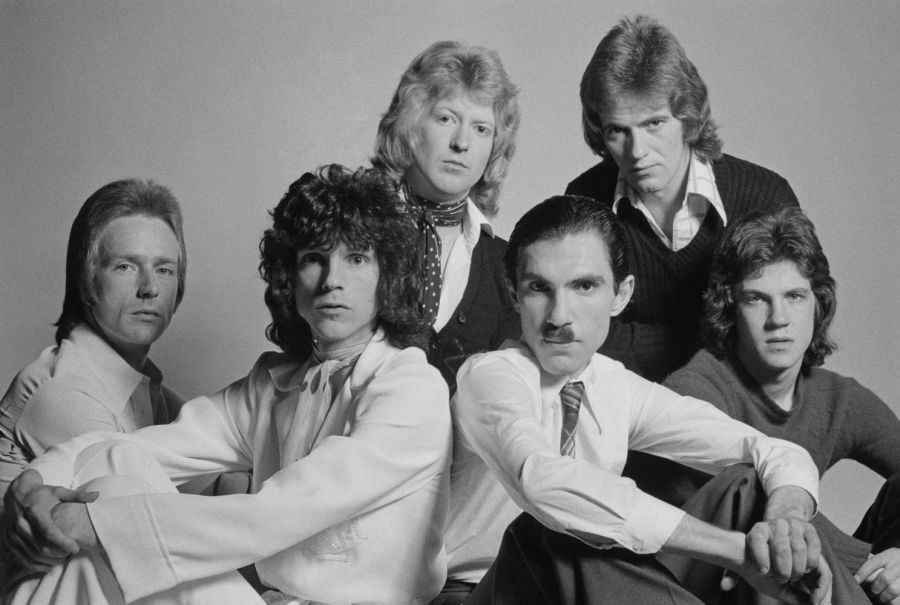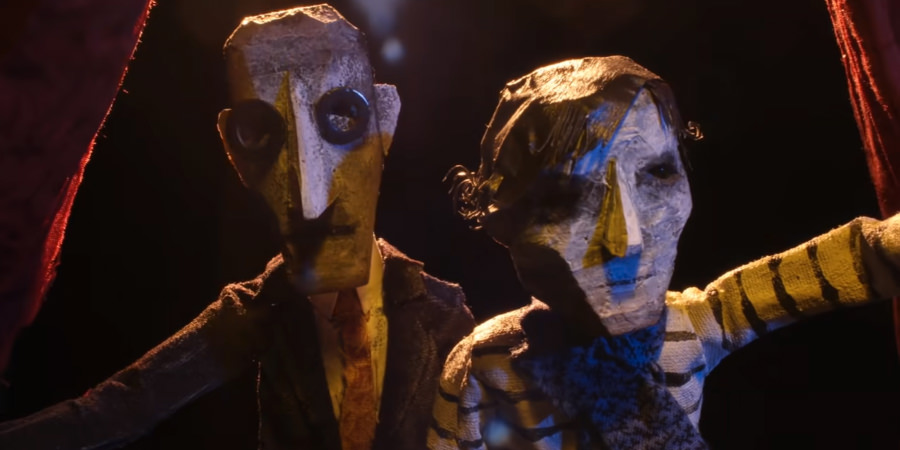The Sparks Brothers
Directed by Edgar Wright (2021) ****
After fifty years of recording and touring and working on side projects, including an unfinished film collaboration with director Jacques Tati, 2021 was finally the year Sparks somewhat entered the mainstream consciousness. There’s something about the group’s sensibility, its mixture of serious ponderings and humor that has nearly always kept away the populace at large. Those consumers, I imagine, don’t believe that wit and irony belong  in glam rock or techno, two genres Sparks made great advances in (and still continue to advance, a rarity in groups who have lasted so long). In addition to director Edgar Wright’s wonderful 140-minute documentary (a much longer version will be available on DVD), Sparks also wrote the music for the French director Leos Carax’s first English language film, Annette, starring actor of the moment Adam Driver and Marion Cotillard, the opening film at the 2021 Cannes Film Festival.
in glam rock or techno, two genres Sparks made great advances in (and still continue to advance, a rarity in groups who have lasted so long). In addition to director Edgar Wright’s wonderful 140-minute documentary (a much longer version will be available on DVD), Sparks also wrote the music for the French director Leos Carax’s first English language film, Annette, starring actor of the moment Adam Driver and Marion Cotillard, the opening film at the 2021 Cannes Film Festival.
Sparks are brothers Ron and Russell Mael. The band formed in 1967, in the brothers’ hometown near Los Angeles. Their father was a professional cartoonist who passed away while the boys were young; their mother indulged their obsession with rock music, twice driving them to see The Beatles in concert. A manager suggested the band call themselves The Sparks Brothers, after The Marx Brothers, but the shorter name stuck. They were fortunate to have Todd Rundgren produce their first quirky album (really, they’re all quirky), but when that and a second LP did little in sales, the brothers took off for London, where they made two masterpieces of over-the-top glam rock, Kimono My House and Propaganda. Their first hit, “This Town Ain’t Big Enough for Both of Us”, landed them on television and No. 2 on the British charts. Among their earliest fans: then critic Morrissey, later of The Smiths, who gave them rave reviews (coincidentally, Sparks and Morrissey would live in the same west coast neighborhood decades later, when Sparks would record the song “Lighten Up, Morrissey”).
Any group with this long of a career is going to have steep ups and downs, and Sparks have recorded their share of mediocre material, never able to stay on any one record label very long (they’ve been on more labels than any other rock group). Their heights, though, have been not only groundbreaking but highly influential to later generations of musicians. A techno album recorded in 1978 with producer Georgio Moroder, No. 1 in Heaven, laid the groundwork for entire genres of later electronic music, including the British synth-pop of the ’80s (Depeche Mode, Erasure, Pet Shop Boys, etc.). Their late masterpiece, Lil’ Beethoven (2002), extended their musical vocabulary, incorporating the mesmerizingly repetitive style of minimalistic classical music into their work. Much of the album’s subject matter is, on the surface at least, about music itself: “The Rhythm Thief”, “How Do I Get To Carnegie Hall?” and “What Are All These Bands So Angry About?”
Though some had attempted to convince the Mael brothers to allow a documentary, Edgar Wright was the right person for the job, as fans of his films are aware; he’s especially attuned to the ways music and visuals can juxtapose, as seen in his Scott Pilgrim vs. the World (2010) and Baby Driver (2017). He smartly puts an emphasis here on the recorded albums, with chronological discussions, excerpts and commentary on each of the 25 albums recorded so far (though Sparks fans know there are many more albums to be had: live albums, remixes, collections of B-sides, etc.)
 The Sparks Brothers is, plain and simple, a joy to watch, whether you’re a longtime fan of the band (I purchased Propaganda in a Rinks department store around 1978), or a complete novice. Their operatic music sounds glorious in a well-equipped movie theatre (the band even wrote a fanfare for the opening credits). The film is packed with rare footage, home movies, excerpts from foreign TV programs and miscellanea. The wide variety of those interviewed for the film is a testament to Sparks’ influence and fan base: comedian Patton Oswald; writer Neil Gaiman; fellow musicians “Weird Al” Yankovic, Beck, Flea and Björk; producers Todd Rundgren and Tony Visconti, to name just a few. The anecdotes, memories and observations are funny and smart.
The Sparks Brothers is, plain and simple, a joy to watch, whether you’re a longtime fan of the band (I purchased Propaganda in a Rinks department store around 1978), or a complete novice. Their operatic music sounds glorious in a well-equipped movie theatre (the band even wrote a fanfare for the opening credits). The film is packed with rare footage, home movies, excerpts from foreign TV programs and miscellanea. The wide variety of those interviewed for the film is a testament to Sparks’ influence and fan base: comedian Patton Oswald; writer Neil Gaiman; fellow musicians “Weird Al” Yankovic, Beck, Flea and Björk; producers Todd Rundgren and Tony Visconti, to name just a few. The anecdotes, memories and observations are funny and smart.
My one disappointment (though probably addressed in the longer version of the film) is that inspirations for Ron Mael’s lyrics aren’t mentioned. When I first encountered the group, I was surprised and delighted that the kind of topical, witty, wry and world-weary lyrics of Cole Porter and Noel Coward were being applied to rock music (as well as the alliterative, quickly sung lyrics and melodies of Gilbert and Sullivan). Sparks has always come from the British music hall and American musical theater tradition and this aspect of their work begs for some in-depth exploration. And still, Wright’s movie packs a lot into 140 minutes, even if it flies by too quickly; I could have watched all day.
—Michael R. Neno, 2021 June 28